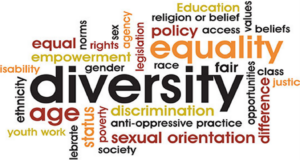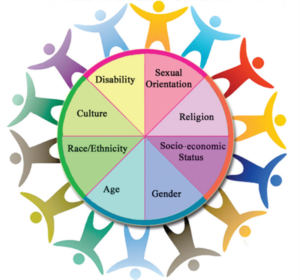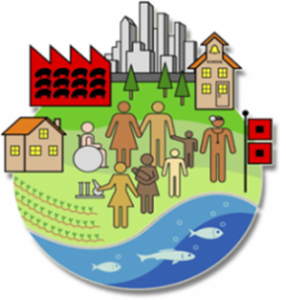Intentional From the Start
Since its founding as a woman-owned business in 1990, CDW Consultants has strived to create a dynamic workplace that promotes and values:
Diversity
The representation of different and unique identities, characteristics, experiences, and perpectives.
Equity
Giving everyone what they need to succeed by providing access, resources, and opportunities for all; especially for those who are underrepresented in the fields of engineering science and have been historically disadvantaged.
Inclusion
A welcoming culture in which differences are celebrated and everyone is valued, respected, and able to reach their full potential.
CDW recognizes that companies which recruit, hire, mentor and promote those who are diverse in age, gender identity, race, sexual orientation, physical or mental ability, ethnicity, and perspective are proven to be better companies. Promoting better hiring practices is only the first step.

Developing and nurturing a culture where everyone, from any background, can feel included allows them to do their best work and is simply the right thing to do. We’ve been committed from the start and are stronger for it.
We are demonstrating our commitment by acting on the following DEI objectives:
1. Identify, attract, and retain diverse candidates.
2. Look for professional development opportunities to increase awareness and education, to keep the conversation going about overcoming systemic and institutional racism, and to acknowledge economic inequities in the engineering community.
3. Financially support one or more regional organizations that are engaged in overcoming poverty, hunger, and barriers to career advancement experienced by undervalued communities.
4. Engage with regional universities to reach and recruit diverse applicants.
5. Hire and pay financially challenged students as interns and mentor those hires in support of their career advancement.
6. Recognize that barriers exist for underserved communities to enjoy healthy air, water, and soil and evaluate ways to help eliminate them.
7. Maintain a culture where open discussion and debate are encouraged on issues of privilege, inequity, and the role of race and racism in society to promote continued learning.
CDW maintains the commitment to equity and inclusion for diversity itself to be most successful. To get diversity to work, our company strives to create an environment in which people from diverse backgrounds experience a sense of equity and belonging. Research suggests that this is more likely to happen in organizations that do not see the “business case” as their primary reason for caring about diversity. We want our employees to care because it’s the right thing to do—as people caring for the “right” reasons will more likely feel included and committed to the organization.

Impacts of Diversity
CDW recognizes the idea that diversity is a valuable asset unto itself, and that diverse teams can generate higher levels of creativity and effectiveness in their work. Having employees of diverse backgrounds, races, ethnicities, sexual orientation, and more helps to create a powerful sense of culture around our mission. It helps ideas flow more easily and with higher quality.
Interdisciplinary knowledge and walks of life are crucial to the holistic success of a company. We have set out as a company to be an advocate for diversity and inclusion and we are dedicated to not only making our office diverse, safe and inclusive but also by showing ourselves as a model to others. Promoting diversity as normative in a company’s culture results in intangibles such as positive vibes and a sense of community well-being but will also eventually reaps tangible benefits to the Company such as worker retention and increased productivity.

Some of the ways we are imbedding more inclusive thinking in our culture are:
Targeted Internships
We actively seek out racially diverse candidates for summer internships with the goal to grow a diverse team organically.
Supporting Economically Disadvantaged
CDW is one of the founding partners with the University of Massachusetts – Boston’s newly launched Federal Work Study Internship Program. Each semester we hire a disadvantaged students and support them through paid work, mentoring, and opportunities to experience meaningful work in the environmental science field, a step towards equity as they chart their future career path.
Participating in Meaningful Ways
CDW employees participate in both the Environmental Business Council of New England (EBCNE), and ACEC-Massachusetts Diversity, Equity and Inclusion (DEI) Committees. EBCNE is an environmental and energy business organization that provides education to its members on environmental issues and regulations. ACEC-MA represents companies engaged in the development of transportation, environmental, industrial, and other infrastructure. The intersection of environmental protection, infrastructure development and the business community within these organizations provides opportunities for meaningful involvement and elevation of environmental and infrastructure issues that affect
historically ignored communities.
One barrier to increased diversity in hiring is the apparent “white-washing” of the environmental field. One reason is that many Black and Latinx youth are raised in urban food deserts that lack greenspace and exposure to the natural world. This results in little connection between an environmental discipline as a career path and their lived experience. This trend extends to academic majors as well. For example, in 2015, 73.4 percent of people who were awarded environmental science degrees across the country were white. In comparison, 47.7 percent of people who were awarded biological or physical science degrees were white. At that time, only 2.9 percent of students awarded a degree in environmental engineering nationwide were Black. Oftentimes in environmental engineering, there is little focus on the social aspects behind the problems engineers work to solve, which is why there may be so few students of color within the discipline.
One of the ways that CDW overcomes this hurdle is to recruit from colleges and universities that have a large and diverse student body in the civil and environmental engineering fields, such as the Boston and Lowell campuses of the University of Massachusetts. Those universities often have within their network a higher percentage of non-white people and can be a powerful source of referral hires.
Combatting Racism
CDW is doing the work to examine systemic racism, sexism, gender, economic and race disparities, as well as unconscious biases.
CDW stands against racism in all forms but also knows that meaningful action is more important than words. We acknowledge that racism can be unconscious or unintentional, and that identifying racism as an issue does not automatically mean those involved in the act are racist or intended the negative impact.

To combat racism, we vow to purposefully identify, discuss, and challenge issues of race and color and the impact(s) they have on our organization, its systems, and its people. We will also challenge ourselves to understand and correct any inequities we may discover and gain a better understanding of ourselves during this purposeful process.
In response to the police killing of George Floyd, a national time of reckoning, we recognized that maintaining silence was to be complicit in ongoing white supremacy. We initiated conversations about ways to amplify support for Black Lives Matter and join in peaceful protest. In June 2020 CDW began a partnership with YW Boston, a local organization that works to change policies, practices, attitudes, and behaviors with the goal of creating more inclusive environments where women, people of color, and especially women of color can succeed. As a woman-owned business, their work resonated with us.
CDW first hosted a fundraising drive and double-matched employee contributions to YW Boston. Then, we promoted their online events to employees and purchased reading materials from YW to promote continuing conversations. One of the highlights was an event entitled “Becoming Part of the Solution: Author Robert Livingston’s The Conversation: How seeking and speaking the truth about racism can radically transform individuals and organizations.” Through actions and steady persistence, we provide opportunities for all of us at CDW to learn and grow, expand our individual and collective understanding of harmful systems and attitudes, and do our part to end racism. This consciousness is now part of CDW’s company culture and philanthropic activities.
Understanding Environmental Inequality
There is widespread data on disproportionate cancer and asthma rates in communities of color, from releases of oil and hazardous materials affecting air, water, and soil. While the regulations governing environmental cleanups in Massachusetts are strict, the reality is that some industries continue to impact non-white communities by violating environmental regulations, accepting pollution penalties in lieu of mitigation, or otherwise prioritizing profits over people.

CDW has had a client-screening tool in place for more than ten years that is used to evaluate each potential client relationship. As part of that, we consider the client’s local, regional and national reliance on fossil fuels, coal-fired power plants, and long-haul supply chains. We gravitate towards and seek out clients who have established sustainability objectives as a meaningful part of their business practices.
Through no fault of their own, communities of color also experience disproportionate climate change impacts due to aging infrastructure, little public investment, and lack of access to environmental data. The most vulnerable people are subject to more powerful storms and floods, intense heat waves, droughts, and other threats from the climate crisis.
CDW has partnered with the non-profit Climate Creative on a project called Rising Waters. The Project creates participatory art projects for communities on the impending effects of rising flood levels. It translates complex data into simple visuals that people can immediately understand and relate to viscerally, helping them visualize what is at risk from coastal and freshwater flooding. The project includes climate community education materials and forums.
Armed with knowledge and data, community activists can more readily participate in government decision-making. CDW amplified Climate Creatives’ own outreach by introducing its Executive Director to officials at the Department of Conservation and Recreation (DCR). As an environmental agency working on creating and maintaining public access to parklands, DCR is an ideal partner for showcasing information in an artistic form to far-reaching communities.
CDW knows that this is a critical moment to pursue bold and equitable solutions that address the legacy of systemic, institutional, and environmental injustices. We will continue to seek out opportunities like those described to advance the goals of economic, gender, racial, climate, and environmental equity to improve the public health and well-being of all communities.

